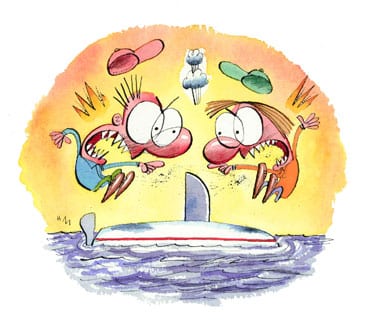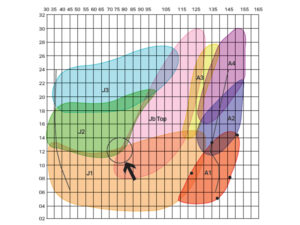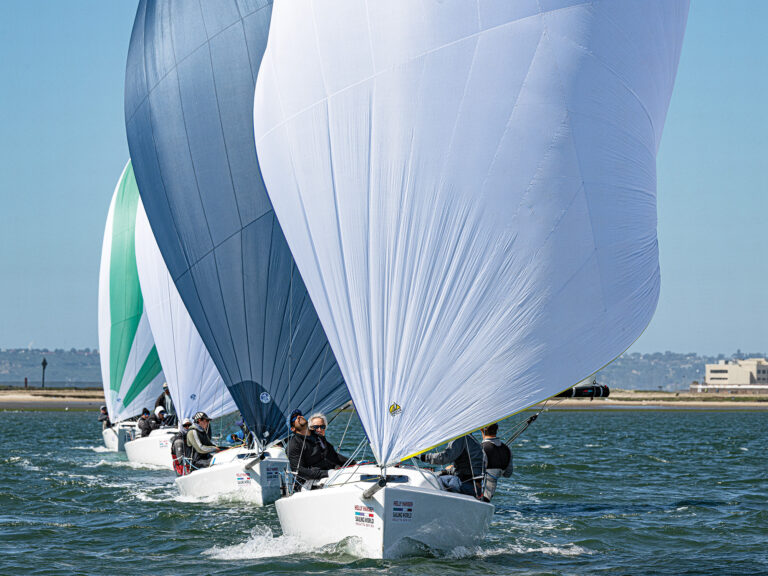
Losing Control
Doc: Hi Sue … Hi Rob
ROB: [muffled grumble]
SUE: Hi Doc.
Doc: I’m guessing from the look of you that you didn’t have a great race today.
SUE: We had a “shouty” race today.
Doc: Oh! They are never much fun … Sue, you can release the headlock now. [Rob stretches his neck.] What happened?
ROB: We had a lousy start, couldn’t pick a shift to save ourselves, T-boned Godzilla at the top mark, and Sue did a nice job of collecting this evening’s shrimp with the spinnaker.
SUE: … and Rob was keen to point to all and sundry the errors of their ways …
Doc: … in language that was not entirely endearing?
SUE: Bingo.
ROB: All right. So I blew a fuse. It happens sometimes. [Sue and Doc both raise eyebrows.] The point is, why is it that getting upset generally means things get worse rather than better?
Doc: Psychologists love that question.
SUE: [to Rob] Be careful what you wish for! [Rob cringes].
Doc: OK. In simple terms, here’s how it works. When you experience a perceived loss of control with regard to outcomes that are important to you (like winning yacht races), that creates uncertainty about what to do—a sort of helplessness—which leads to anxiety.Loss of control leads to uncertainty, which leads to anxiety.
ROB: I knew he would go for anxiety.
Doc: And depending on how strong that anxiety is (and who the person is), it leads to a mixture of three things—energy, hyper-vigilance, and defensive behavoir.
SUE: … and shouty races.
Doc: That is, anxiety leads us to the three responses that are designed to keep us safe when we feel threatened. Now, those things aren’t all bad. They are actually a fairly primal and important self-preservation response set. Unfortunately, unless they can be harnessed, and focused on the right things, they can drag us away from the important tasks that help us win yacht races—like clear decision-making and smooth maneuvering.
ROB: Is that what “choking” is all about?
Doc: It’s certainly a big part of it. People feel the pressure, and the sense of control starts to slip away. Then, everything starts to fall apart.
ROB: So how do you make this stuff “functional” then?
Doc: That is where all this “let’s get back to basics” stuff comes from. Sport psychologists use all sorts of approaches to help people regain their focus on what’s important and get control of the anxiety responses. You see, it’s not about not feeling anxious—that’s just a normal human response. It’s about building reliable and functional responses to that anxiety. The key is being able to redirect your attention to the simple and clear focal points that deliver performance. If you have access to strong and accessible focal points, then the model starts to go in reverse—good focal points lead to increased certainty, which leads to an increasing sense of control and to calm and harnessed energy. Focus leads to certainty which leads to control which leads to calm energy.
ROB: Yeah, yeah, blah, blah. That all sounds really cool. But what does that look like in practice?
Doc: Sue, what do you reckon are thinking skills that sit at the core of good performance?
SUE: Well, my junior-sailing coach was always hammering on about concentration. I can still hear her yelling through the bullhorn, “Concentrate! Can’t you kids stay focused for more than ten seconds?”
ROB: She sounds like some coach.
SUE: Well, I have deleted the expletives.
Doc: I think she’s right though. Concentration is one of the two key thinking processes for sailing, but concentration on what? Concentration necessarily has to be directed at something. When you are trying to win yacht races, what is the most important thing you need to concentrate on?
ROB: Speed. You just have to go fast.
Doc: . . . and that is usually the first thing to go out the window when sailors get anxious. The hyper-vigilance means they start looking around at everything except the basics of what makes a boat go fast—steering well, trimming well, and using your body weight to maximum effect. The basics.
SUE: [looking directly at Rob] Common sense, really.
ROB: [ignoring Sue] So if we’re talking basics, and you said there were two of them, what’s the other one?
Doc: Anticip… [Sue and Rob rock forward in their seats, Doc smiles] … pation. The hyper-vigilance that anxiety produces seems get our attention focused tightly on the here-and-now, or, too often, on the recent past.
Sue: [mumbling] … Hallelujah to that!
Doc: The key to rebuilding a decent performance in a race that is not going well is to start looking for what will happen next. It is that simple focal attention shift that expands the time we have to make good decisions.
ROB: Hold it. You’re being simplistic again. All you’ve managed to say is that when things turn to custard, “concentrate on speed and start looking up the course.” If it were that easy, we’d all do it. Where’s the rocket science?
Doc: So did you concentrate and anticipate in the race?
SUE: [reapplying the head lock] Thanks, Doc. I think he’s got the message—or might eventually.









